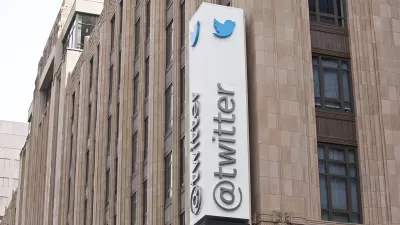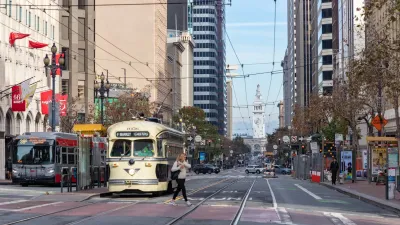The 2011 "Twitter tax break" was controversial at the time, and remains so to this day. New offices and employees have filled the corridor of Market Street where the tax break is in effect, but massive challenges persist.

J.K. Dineen surveys Market Street in San Francisco to evaluate the results of the 2011 "Twitter tax break."
The 1.5% percent payroll tax was championed by the late Mayor Ed lee and approved by the San Francisco Board of San Francisco with the reasoning that the tax break for companies that moved into certain Mid-Market buildings, "would keep tech jobs in the city and help revive seedy Central Market Street."
"At the time, half the area’s offices and 30% of the retail shops were empty, according to city data," according to Dineen. There area has changed, and there are lots of people now working in formerly empty buildings.
Still:
These days it would be a stretch to call Central Market Street a “grand boulevard.” Even after billions of dollars of investment has filled vacant office buildings with 10,000 new jobs, revived historic structures and generated 4,000 new housing units, Mid-Market business owners say the street is more problematic than ever and remains marred by crime, drugs, garbage, vacant storefronts and stalled development projects.
The feature-length article includes an infographic that details the new buildings and renovations that have transformed the streetscape of Market Street as it passes through the Mid-market neighborhood—24 projects are on the map. Despite the new office buildings, "retail vacancies plague the street," and beyond the buildings, drug use, homelessness, and mental illness are on display every day.
FULL STORY: Street of dreams

Planetizen Federal Action Tracker
A weekly monitor of how Trump’s orders and actions are impacting planners and planning in America.

Map: Where Senate Republicans Want to Sell Your Public Lands
For public land advocates, the Senate Republicans’ proposal to sell millions of acres of public land in the West is “the biggest fight of their careers.”

Restaurant Patios Were a Pandemic Win — Why Were They so Hard to Keep?
Social distancing requirements and changes in travel patterns prompted cities to pilot new uses for street and sidewalk space. Then it got complicated.

California Homeless Arrests, Citations Spike After Ruling
An investigation reveals that anti-homeless actions increased up to 500% after Grants Pass v. Johnson — even in cities claiming no policy change.

Albuquerque Route 66 Motels Become Affordable Housing
A $4 million city fund is incentivizing developers to breathe new life into derelict midcentury motels.

DC Area County Eliminates Bus Fares
Montgomery County joins a growing trend of making transit free.
Urban Design for Planners 1: Software Tools
This six-course series explores essential urban design concepts using open source software and equips planners with the tools they need to participate fully in the urban design process.
Planning for Universal Design
Learn the tools for implementing Universal Design in planning regulations.
Heyer Gruel & Associates PA
JM Goldson LLC
Custer County Colorado
City of Camden Redevelopment Agency
City of Astoria
Transportation Research & Education Center (TREC) at Portland State University
Camden Redevelopment Agency
City of Claremont
Municipality of Princeton (NJ)



























